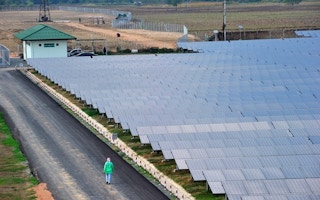Environmental groups in Southeast Asia are urging governments of the 10-member Association of Southeast Asian Nations (Asean) to present a united and ambitious climate action plan for the upcoming climate conference in Paris this December.
To continue reading, subscribe to Eco‑Business.
There's something for everyone. We offer a range of subscription plans.
- Access our stories and receive our Insights Weekly newsletter with the free EB Member plan.
- Unlock unlimited access to our content and archive with EB Circle.
- Publish your content with EB Premium.
Asean countries are in a position to contribute significantly to the Conference of Parties (COP21) to reach a fair and binding global climate agreement by including in their intended nationally determined contributions (INDCs) projects that support low-carbon energy policies, the Asean for a Fair, Ambitious and Binding Global Climate Deal Coalition or A-FAB said in a statement on the sidelines of the Regional Forum on Climate Change held in Bangkok on July 3.
INDCs are the basis of the emissions reduction targets which will be agreed in Paris by over 190 countries. The UN Intergovernmental Panel on Climate Change (IPCC), in its latest report issued last year, warned of the disastrous and irreversible impact of the Earth’s warming to human lives if the increase in carbon dioxide in the atmosphere coming from the burning of fossil fuels continues unabated.
With extreme weather events such as super typhoons, floods and droughts becoming the new norm in the region, it is essential for Asean to take substantial action to address the causes and impacts of climate change, the group added.
A-FAB, composed of Oxfam, Greenpeace, and the Eastern Regional Organization for Public Administration, published on May 13 a policy brief presenting concrete recommendations on how Asean countries could develop more impactful INDCs.
INDCs should not be considered a mere document for Asean countries to submit and fulfill the requirement of the UNFCCC, but should be seen as an opportunity to express the region’s aspirations towards sustainable development, the policy brief noted.
Dr. Gary Theseira of the Ministry of Natural Resources and Environment in Malaysia and author of the report, commented, “A meaningful INDC reflects a country’s full capacity to combat climate change. It will also be better if it includes ample information on how a country’s greenhouse gas emissions can be further reduced.”
Theseira cited several initiatives that may be included in the INDCs such as investing in renewable energy, promoting energy efficiency, setting targets for reducing deforestation and advocating clean transportation alternatives.
Asean countries should also include clear indicators on how to successfully implement the commitments they would include in their INDCs, Theseira added.
“
A meaningful INDC reflects a country’s full capacity to combat climate change. It will also be better if it includes ample information on how a country’s greenhouse gas emissions can be further reduced.
Dr. Gary Theseira of the Ministry of Natural Resources and Environment in Malaysia
Zelda Soriano, legal and political advisor of Greenpeace Southeast Asia and a member of A-FAB, said in the statement that Asean’s concerted climate actions are significant in light of the region’s plan to become a single economic bloc.
The economic integration, slated to happen in December, will include Singapore, Malaysia, Thailand, Philippines, Myanmar, Brunei, Cambodia, Laos, Vietnam and Indonesia.
“The burning of fossil fuels for energy production has been found to be primarily responsible for emitting large amounts of greenhouse gases. A harmonised Asean policy reform to de-subsidise coal, oil and gas, and to support renewable and other low carbon technologies is therefore necessary, especially in the context of the Asean economic integration,” explained Soriano.
At the regional forum, Philippe Zeller, France’s COP21 ambassador to Asia, expressed similar sentiments about the region’s need to be more coordinated in addressing climate-related issues, especially in harnessing renewable energy. The region can do more as a bloc, he told the media.
Asean member countries, except for Singapore, have yet to submit their INDCs with only five months left before formal negotiations on emissions reductions. Singapore submitted its INDC on July 3 and has pledged to reduce its emissions intensity by 36 per cent from 2005 levels by 2030.
Riza Bernabe, policy and research coordinator for the East Asia GROW campaign of Oxfam, commented that climate change adaptation should also be included in the INDCs. “One of the biggest challenges confronting many Asean member states is helping poor communities across the region adapt to climate change,” she said.

















